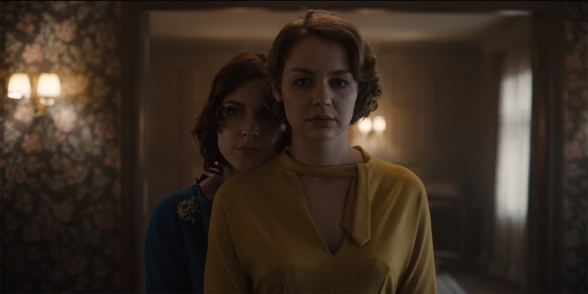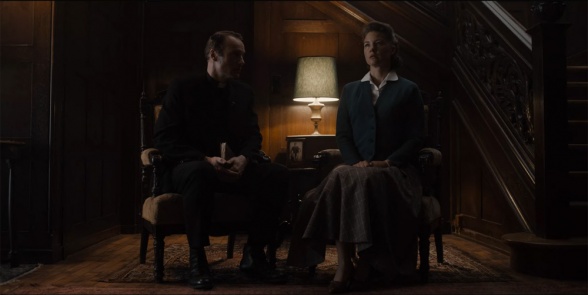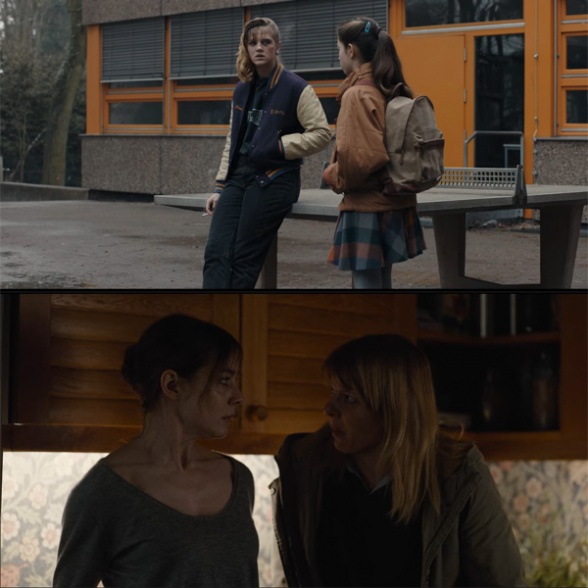Welcome to this week’s installment of the Summer TV Binge of Netflix’s Dark, analyzing the ninth chapter of the twisted German time travel series, released December 1, 2017. Please be aware that this page mentions sexual assault in passing.
“Everything is Now (Alles ist Jetzt)”
Written by Jantje Friese and Marc O. Seng
Directed by Baran bo Odar
November 11, 1953, 1986, and 2019: Ulrich is arrested after confessing to the attempted murder of Helge Doppler. Hannah blackmails Aleksander Tiedemann. Claudia introduces herself to her grandson Bartosz. Martha confronts Jonas over why he’s avoiding her.
1. Helge’s False God
Tannhaus’s opening narration, played over the faces of the cast in quick succession, ponders man’s ultimate question: why are we here? Is it the work of God? Or meaningless chaos? The existential fear of the latter recurs throughout this episode, starting in 1953 with Agnes Nielsen helping Doris Tiedemann trying on some dresses she recommended. The sexual tension between the two is very apparent; Doris tries to defuse it by asking Agnes what kind of man her husband was, and she replies, “He was a pastor. But I can’t say he was a man of faith,” before adding, “sometimes I think it’s good he’s dead.”

The next scene implies Noah may be her not-so-dead husband, showing him counseling Greta Doppler after her son’s disappearance. She confesses she wished Helge had never been born, because he may not be Bernd’s child, but a product of rape. (“Maybe he wasn’t a child created out of love, but…,” she says, before stopping.) Noah reminds her, “We are all full of sin. No pure human being exists. But no matter what we do, we never fall any lower than into God’s hands.” After eyeing her son in the family photo, he asks her to recite Psalm 23 with him.

The full duplicity of Noah is exposed during the segment in 1986, where he and the middle-aged Helge are seen repairing the chair in the bunker. It’s revealed the temporally displaced bodies were attempts to build their own time machine, with the test subjects being rendered dead on arrival by the chair. Helge finally musters the courage to say he’s done with this, asking why God’s plan would involve child sacrifice.
Noah replies there is no God, and that Helge’s complicity is fine because “people are bad. Malicious, evil. Life is nothing but a spiral of pain. And the world is doomed to be destroyed. But this here… this is our ark. And I’m Noah. If we can harness this energy, we can change everything. Then we decide the world’s fate, far removed from all the evil and from all pain.” In other words, the ends would erase the means, and Noah has made the mistake of believing he can take life like God does.
2. Mein Name is Aleksander Tiedemann
After the teenage Ulrich is released from custody in 1986, Hannah suggests to Katharina that Regina may have made up the rape allegation. Assuming it was revenge for tying her to a tree, they confront her the next time they see her walking home, but a wounded stranger with a pistol comes to her defense, scaring them off. He collapses, and Regina brings him to her home to be bandaged; he tells her his name is Aleksander. You could tell; Béla Gabor Lenz looks so much like a young Peter Benedict it’s eerie, even if his nose is larger (when it should be the other way round).
After he’s patched up, Aleksander applies to work at the plant as a metalworker; Claudia gives him the task of sealing the door to the part of the caves containing the barrels, while Regina begins straightening her hair for her savior and eventual husband. But where did he come from? Hannah spies him burying his gun and two passports in the forest; one passport carries the name of another man, Aleksander Kohler, while his own one reveals his true name is Boris Niewald. That name, as well as the Polish one of his son Bartosz: could Aleksander have come from beyond the Iron Curtain?
Continued below3. Dead Man Running
Meanwhile in 1953, the bruised and bloodied Ulrich finishes waiting for Helge to die; he declines to check the body though, his hands still shaking from the guilt. As he wanders back to the cave, he’s spotted by Egon Tiedemann, who apprehends him, after an intense pursuit, with a warning shot. The cop demands to know if he has anything to do with the dead boys, causing the baffled Ulrich — who was certain he had ensured the bodies would never appear — to confess to attempted murder, and Egon to cuff him. We realize why the older Egon instinctively disliked Ulrich in 1986, and why he will tell him, “Your face. Your stare. I know that stare. I know that you’ve got something to hide.”
Over in 2019, Katharina bursts into Charlotte’s office, demanding to know where Ulrich is, but she responds he was suspended, and that he hasn’t been answering his phone. Katharina incorrectly deduces he’s with Hannah, and goes to the Kahnwald house to confront her. All things considered, it’s a less volatile clash than you’d expect, likely because Katharina still sees Hannah as the little girl who hung around them; Hannah uses that to spin another lie, claiming she ended the affair, while Ulrich encouraged it, and that he’s skipped town, causing Katharina to transition from anger to grief over her marriage, and giving Hannah another opportunity to pose as a comforter.

Hannah continues her revenge by blackmailing Aleksander at the plant, revealing she recovered his passports and pistol all those years ago. “Why do you and Regina have a beautiful home, and I can’t even pay my electrical bill?,” she asks. She doesn’t want money though: she just wants him to destroy Ulrich, whenever he turns up, something Aleksander is as disturbed by as we are. Whether she’s lying or telling the truth, Hannah knows how to tear peoples’ lives apart, not that it makes Ulrich innocent — he has only himself to blame for what he has reaped from adultery and violence.
4. Claudia Returns
This chapter finally resumes Claudia’s story in 1986: before hiring Aleksander, she returns to the cave with the barrels, where she encounters her dog Gretchen, unchanged 33 years after her disappearance. She confronts Bernd over the canisters; he explains there was a leak at the plant that year — lining up with what the Stranger told Tannhaus — and claims that the caves are “as safe as any other official interim storage facility.” (Hiring the drifter would’ve continued to keep the barrels off the books.)
In 2019, the old, dishevelled Claudia shows up at her family home, greeting her grandson Bartosz. He tells her Regina said she died before he was born, but doesn’t seem at all perturbed by this strange woman, claiming to be his grandmother, in their garden. Claudia doesn’t blame her daughter for saying that, admitting she wasn’t a good mother. “Believe me, if I could turn back time, I would do lots of things differently,” she says, an acknowledgment of how linear history remains even on this show. She asks him to give her a photo of them, from before the summer everything changed.

Bartosz meets Noah, and informs him what he predicted came to pass — it seems there’s a war going on, and Claudia and Noah are on opposite sides of it. At his office, Aleksander calls Woller for dirt on Ulrich, revealing he’s in on the removal of the barrels, now stored in a truck parked at the service station. The Stranger enters and retrieves a sample of whatever’s inside the barrels, while in 1953, old Claudia enters Tannhaus’s shop and gives him the blueprints for his time machine — if Noah is the master of Helge and Bartosz, then she and the Stranger are presumably allies, but we should know by now it’s never that simple.
5. Jonas’s Isolation
And what of our young hero Jonas, who was absent from the two prior episodes? He’s depressed, avoiding Martha’s calls and texts after discovering the horrible truth of their relationship. Frustrated with how he’s ghosted her since they kissed, she waits for him at his house as he returns from a bike ride, in an incredible rain-soaked scene done in one take.
Continued belowJust as his mother behaved passively towards Katharina, Jonas stands stoney-faced, unable to say anything, while Martha’s anger rises. He’s only able to say their love is “wrong,” prompting her to ask, with a kiss, how it could possibly be wrong. However, after realizing he did not enjoy that, she backs away, ashamed. “I’m sorry,” he replies instead, leaving. Louis Hofmann and Lisa Vicari’s performances are simply perfect.
Other Observations:
– Helge’s misplaced devotion should’ve been given away by his name: it derives from the proto-Norse word for “dedicated to the gods.” On that note, before the bloodied young Helge awakens on the floor of the bunker, his arms are stretched out like the cross.
– Egon tries to enter Helge’s cabin and the bunker in 1986, but is unable to: however, we know an accident happens to Helge soon, even if it’s not the reason he didn’t have his police interview.
– Magnus gives Franziska the necklace he found, but she’s reluctant to tell him more about it, coldly informing him “just because we fuck, doesn’t mean you have to know everything about me.” (At least they still get on better than their parents.)
– Regina enters the Stranger’s room, and is shocked by its resemblance to a serial killer’s operations.
Before we go, a special thanks to Mark Tweedale for drafting a featured image (below) for this post — you can download a full resolution version here, and do check out his coverage of Netflix’s Kipo and the Age of Wonderbeasts if you haven’t.

We’ll return next week for our look at the first season finale, “Alpha and Omega.”






